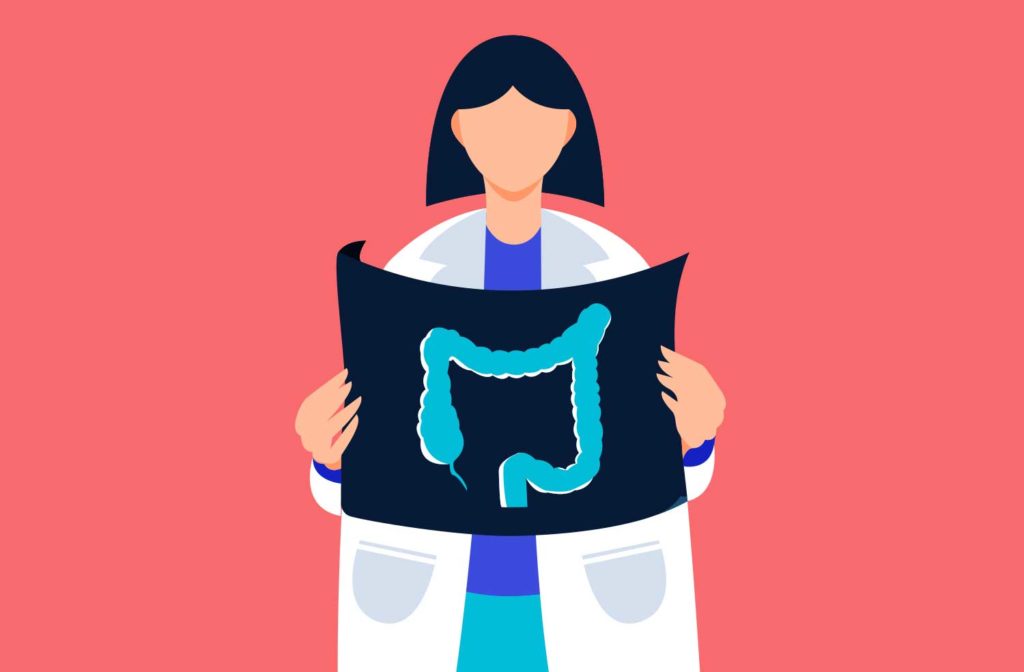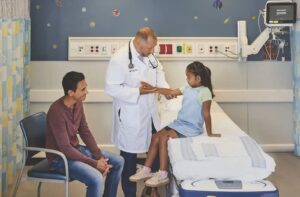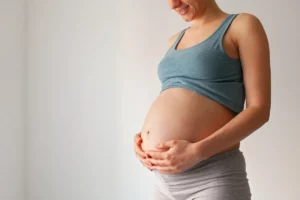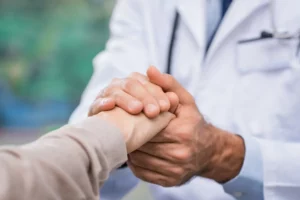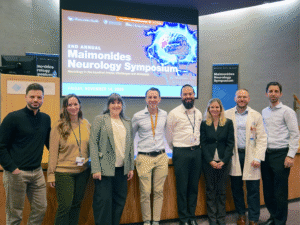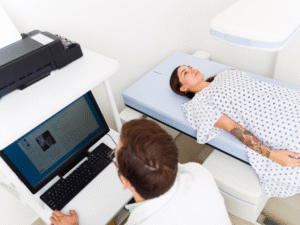Summary
Should I get a colon screening? Which one should I get? Join us as we talk with Dr. Yuriy Tsirlin who discusses the crucial role screening plays in preventing cancer, the types of colon screening, and why young people should pay close attention.
Listen on Spotify Listen on Apple Podcasts Listen on Google Podcasts
Transcript
Amanda Wilde (Host): Colon cancer affects young people as well as those over 40. Today, we’ll talk prevention with Dr. Yuriy Tsirlin, gastroenterologist at Maimonides Medical Center. This is Maimo Med Talk. I’m your host, Amanda Wilde. Dr. Tsirlin, thank you for your time today. How common is colon cancer?
Dr Yuriy Tsirlin: Colon cancer is very common. It’s the third cancer in the United States affecting both men and women. It’s the second cause of cancer death in the United States, only coming after lung cancer. So one in about 17 Americans are going to get colon or rectal cancer during their lifetime. So we consider that to be a very common cancer in the population.
Amanda Wilde (Host): What are you seeing as a GI specialist that gives you concern?
Dr Yuriy Tsirlin: Well, unfortunately, we’re seeing more cancers recently, and we’re seeing more cancers in younger people. In fact, recent guidelines over the last two years have changed, because in the past, the colon cancer screening was recommended to those over the age of 50. But now, we realize that people younger between ages of 40 and 50 are getting colon cancer. So the new guidelines actually recommended to start screening at the age of 45.
Amanda Wilde (Host): So there are several options for screening tests. Can you describe the different options and explain the differences?
Dr Yuriy Tsirlin: Absolutely. So one of the ways we separate these options is whether it’s a one-stage test or a two-stage test for screening. So one-stage test means that you can find an abnormality and remove it or take care of it at the same time, which is a colonoscopy. That’s a one-stage test. The other tests are alternatives and they typically involve two stages where you do an alternative test. But if it’s abnormal, then you go through a colonoscopy. And we have multiple alternatives available. We have stool tests, something called occult blood testing. We also have something called FIT, that’s fecal immunohistic chemical testing, which also tests for human globin, a part of the blood in the stool. We also have stool DNA testing. We have a flexible sigmoidoscopy, which is a partial colonoscopy relative to colonoscopy. And we have a virtual colonoscopy, which is a CAT scan. So we have multiple modalities that people can choose and pick to be their screening modality.
Amanda Wilde (Host): Yeah, that’s a lot of options. How does a person know which screening test is the best one for them?
Dr Yuriy Tsirlin: The best option is to speak to their doctor or to speak to a gastroenterologist who are usually versed in the different options. We typically suggest that if a person has access to a colonoscopy and healthy enough to have a colonoscopy, it’s considered to be a better test. But it does have some limitations. It requires anesthesia. It requires the person to take time off work, travel to the endoscopy center. It needs someone to pick them up, so they need to have a ride. So some people may not want to have that procedure done and they may pick a different test. And a different tests will also depend on what their comfort level is. Some people will choose a certain type of a stool test because they can do it at home. Some people will decide to do a CAT scan because they prefer that. And each test has its benefits and its limitations and its risks. So for each one, they really need to discuss with their physician what’s best for that person if they don’t want a colonoscopy done.
Amanda Wilde (Host): And there are these at-home test kits. How reliable are those?
Dr Yuriy Tsirlin: They’re fairly good as an alternative testing. It depends on the type of test. Some are a little bit better than others. it all depends on the person that’s doing it if it’s done properly. Most of them require being repeated, either every year or every three years. And if done correctly, they do pick up a good number of cancers, early cancers or advanced polyps, which will prompt the person to go get a colonoscopy and have those polyps removed or cancer treated. So if the person wants to do a test at home, then we do have those options.
Amanda Wilde (Host): So it sounds like some of these lead to colonoscopy. Is colonoscopy sort of the gold standard for screening?
Dr Yuriy Tsirlin: Generally, it’s considered to be a gold standard. In reality, we don’t have a gold standard because every test has its limitations and every test has its risks. The colonoscopy is the one test that’s able to visualize the colon and remove the polyps before they grow into cancers. So any tests that you would do if it’s abnormal, then that leads to a colonoscopy, that would be the ultimate test to visualize the intestine and remove the polyps if they are there.
Amanda Wilde (Host): Now, you said that the screening guidelines have changed. It’s disturbing to hear what you said earlier, that more people in our 20s, 30s and 40s are being diagnosed with colon cancer. Why is this suddenly on the rise in this younger population?
Dr Yuriy Tsirlin: Unfortunately, we don’t have a good answer of why colon cancer is increasing in younger people. In older people, it’s actually getting better. The incidence of colon cancer in people over the age of 50 is going down and it has been going down since the 1980s. But over the past 20 years or so, we are seeing that in the younger patients, especially at 20 to 30 or 30 to 40 range, the rates have doubled, and we don’t know why. It may have to do something with our diets, our environment. but we’re not sure why that’s happening.
The good news is that, even though the rates are high, the absolute numbers are fairly low. It’s still rare to see a young person with colon cancer. But if the rates continue to increase in such a high rate, then we’re going to see more and more of a younger people with these cancers.
Amanda Wilde (Host): What can young people do to stay healthy?
Dr Yuriy Tsirlin: Well, I think the best approach is to minimize the risk factors. Unfortunately, we don’t have a good screening program for young people just because it’s still pretty rare. And it’s very hard to screen a very large population to find few cancers, but what can be done is to decrease the risk factors that we know are associated with colon cancer and with polyps, things like smoking, we know smoking is associated with more colon polyps. And the way we understand how colon cancer works is that cancer comes from polyps over a period of time. We know that obesity is associated with colon cancer. We know that eating processed foods like hot dogs and cold cuts is associated with more colon cancer. So those are the things that can be modified, eating a healthier diet, stop smoking. Avoid too much alcohol. Those are all the things that we know have a strong association with colon cancer, and you’re reducing your risk that way.
Amanda Wilde (Host): And then, like what signs or symptoms should a young person or indeed anyone be aware of? Are there signs that something might be wrong?
Dr Yuriy Tsirlin: There are definitely signs when something is wrong. Unfortunately, when colon polyps are small, there are usually no signs. But when they get bigger or when there’s early cancer, the person may have some pain that they didn’t have before. They may have some rectal bleeding that they didn’t have before that’s not going away. They may be losing weight. Very often in young people, those symptoms are ignored because they’re young and healthy and they’re not considered as candidates for someone who would have cancer. But we know that the young people do get cancer and they’re getting it more. So anyone should be vigilant when they get those kinds of symptoms. If they have unexplained rectal bleeding, if they have new pain that’s not going away, that should be checked out. That shouldn’t be ignored.
Amanda Wilde (Host): If someone is diagnosed with colon cancer, what’s the rate of curability? Is colon cancer curable?
Dr Yuriy Tsirlin: It is curable when it’s earlier, definitely. That’s why we are screening people because the hope is to find precancerous lesions and remove them or find cancer at at an early stage. When colon cancer specifically is found at an early stage, then the survival was excellent. Once the cancer becomes more advanced, it’s much more difficult to control. There are still treatments, but it may not be curable at that point.
Amanda Wilde (Host): So screening is really necessary.
Dr Yuriy Tsirlin: Absolutely. Screening is the best method to prevent cancer. That’s one of the cancers that we have when we can actually prevent cancer from happening. We don’t have that option with many other cancers.
Amanda Wilde (Host): Dr. Tsirlin, thank you for explaining the statistics and prevention and screening options. This is information we don’t want to sit on it. Prevention is key. I appreciate your time today.
Dr Yuriy Tsirlin: Thank you so much for having me.
Amanda Wilde (Host): If you’d like to schedule an appointment for a colon cancer screening or to see Dr. Yuriy Tsirlin, please call 718-283-5900 or visit our website, maimo.org, M-A-I-M-O.org. This has been Maimo Med Talk. I’m Amanda Wilde. Stay well.

